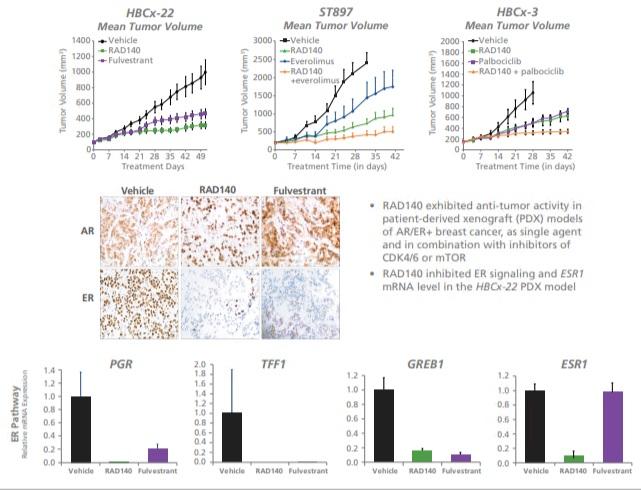RAD140 Chemische Eigenschaften,Einsatz,Produktion Methoden
Beschreibung
RAD140 (also known as Testolone) is an oral nonsteroidal selective androgen receptor modulator (SARM) that cannot be converted to estrogen by aromatase. It has been demonstrated that RAD140 has high AR affinity and target selectivity, showing marked tissue-selective AR agonist activity comparable to natural androgens in breast cancer cells, while lacking agonist activity in prostate cancer cells.
We have recently reported anti-tumor activity of RAD140 in multiple in vivo and in vitro models of AR/ER+ breast cancer as a single agent and in combination with inhibitors of CDK4/6 and mTOR.
Pharmacodynamic investigation indicates RAD140 acted as an AR agonist in breast cancer cells while suppressing ER signaling and reduced ESR1 mRNA expression.

RAD140 exhibited anti-tumor activity in patient-derived xenograft (PDX) models of AR/ER+ breast cancer, as single agent and in combination with inhibitors of CDK4/6 or mTOR
RAD140 inhibited ER signaling and ESR1 mRNA level in the HBCx-22 PDX model.
Verwenden
RAD140 is a potent, orally bio-available, and non-steroidal selective androgen receptor modulator (SARM) for the treatment of conditions such as muscle wasting and breast cancer.
benefits
Significant and selective anabolic effect on muscles and bones, without strong androgenic adverse effects on other organs
Has strong neuroprotective effects, may be effective in preventing Alzheimer’s disease and related neurodegenerative disorders
Has the potential to fight breast cancer
Can help treat serious diseases associated with muscle loss
Can help protect brain cells and their proper functions
May help in the treatment of osteoporosis
Helps build and maintain muscle mass
May help reduce excess fat
Biologische Aktivit?t
RAD140 is an orally bioavailable, nonsteroidal selective androgen receptor modulator (SARM) that binds to the androgen receptor with a Ki value of 7nM. At 0.03-0.3mg/kg, it has been shown to stimulate muscle weight increase without affecting prostate or seminal vesicle in castrated male rats. At 0.3-1 mg/kg, RAD140 demonstrates partial antagonist activity in seminal vesicle and prostate.
Nebenwirkungen
In animal studies, RAD 140 has shown to be safer than testosterone replacement therapy, when administered to rats. This is impressive, given the general positive safety profile of testosterone, hence its FDA-approved status.
However, in humans there appears to be a different trend, with RAD 140 demonstrating harsher side effects.
Suppressed levels of natural Testosterone
Anxiety, depression
Nausea and vomiting
Possible liver toxicity
Abnormal body hair growth in women
Excessive hair loss in men (which stops after the end of RAD140 treatment)
The long-term effects of RAD140 are unknown
RAD140 Upstream-Materialien And Downstream Produkte
Upstream-Materialien
Downstream Produkte

